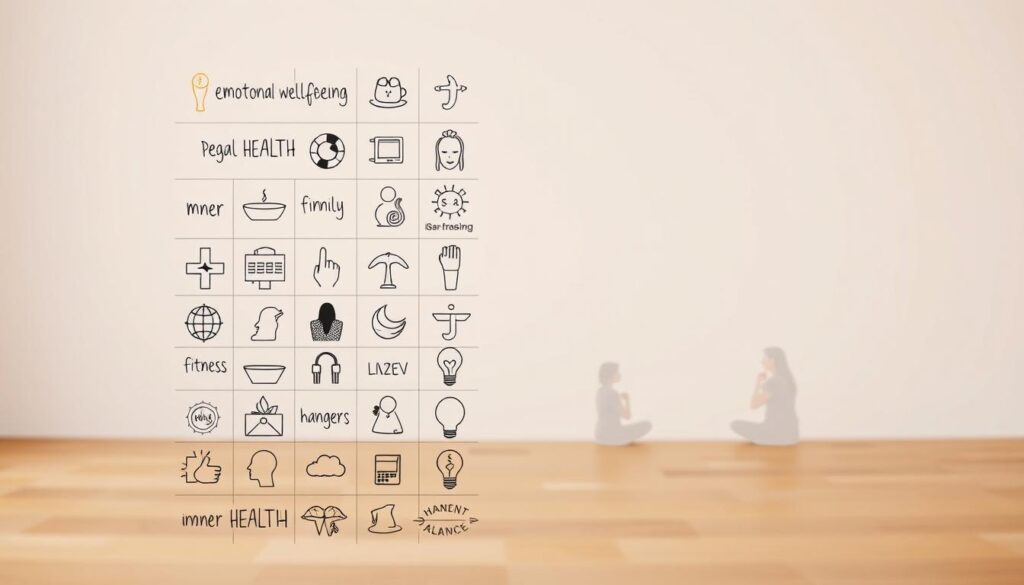The way we discuss mental wellness has a profound impact on how we perceive it. Language plays a crucial role in shaping our understanding of mental health conditions and approaches to wellness.
Over time, the terminology surrounding mental health has evolved significantly, contributing to a reduction in stigma. Using alternative terms and synonyms can help create a more nuanced and compassionate dialogue.
Having a broader vocabulary for mental health concepts can improve communication between patients, healthcare providers, and the general public. This, in turn, fosters a more supportive environment for those affected by mental health issues.
Key Takeaways
- Understanding alternative mental health terminology is crucial for effective communication.
- Language influences our perception of mental health conditions and wellness approaches.
- The evolution of mental health terminology has contributed to reducing stigma.
- A broader vocabulary for mental health concepts improves patient-provider communication.
- Different cultures conceptualize mental health through various words and expressions.
The Importance of Mental Health Terminology
Mental health terminology is not just about words; it’s about the impact those words have on individuals and society as a whole. The language used in mental health discussions can either perpetuate stigma or promote understanding and support.
Why Language Matters
The words we choose when discussing mental health can significantly affect how individuals perceive their conditions and themselves. Stigmatizing language can lead to feelings of shame and isolation, while positive and affirming terminology can foster a sense of community and support.
Breaking Stigma
Using positive mental health synonyms can help reduce stigma by changing the narrative around mental health conditions. For instance, replacing stigmatizing terms with more accurate and affirming language can encourage more people to seek help. Advocacy efforts to change mental health vocabulary in media, healthcare, and public discourse are crucial in this endeavor.
By adopting positive terminology, we can transform the conversation around mental health from one of shame to one of wellness and growth. This shift can have a profound impact on individuals’ self-perception and recovery journeys.
Common Mental Health Synonyms and Their Meanings

The language used to describe mental health is diverse and multifaceted, with various synonyms offering different perspectives on the concept.
Emotional Well-being and Balance
Emotional well-being refers to the state of being comfortable with one’s emotions and having the ability to manage them effectively.
Self-control and Composure
Having self-control means being able to regulate one’s emotions and behaviors, even in challenging situations.
Emotional Equilibrium
Emotional equilibrium describes a state of balance between different emotions, leading to overall stability.
Psychological Health and Soundness
Psychological health encompasses not just the absence of mental illness but also the presence of positive mental states.
Sanity and Rationality
Sanity refers to the quality of being sane or having a healthy mind, while rationality involves making decisions based on reason.
Cognitive Well-being
Cognitive well-being involves maintaining good mental functioning, including aspects like memory, problem-solving, and decision-making.
Mental Resilience and Strength
Mental resilience is the ability to withstand or recover quickly from difficult conditions or challenges.
Mind Wellness
Mind wellness is a holistic approach to achieving overall mental well-being.
Psychological Wellness
Psychological wellness is a comprehensive term that includes emotional, social, and cognitive dimensions.
| Synonym | Meaning | Example |
|---|---|---|
| Emotional Well-being | State of being comfortable with one’s emotions | Managing stress effectively contributes to emotional well-being. |
| Psychological Health | Presence of positive mental states and absence of illness | Regular exercise supports psychological health. |
| Mental Resilience | Ability to withstand or recover from challenges | Developing coping strategies enhances mental resilience. |
Positive and Impactful Mental Health Synonyms

Positive and impactful mental health synonyms play a vital role in shaping our understanding of well-being. Using language that emphasizes strength and resilience can help shift the focus from pathology to overall health.
Inner Harmony and Mindfulness
Inner harmony refers to a state of balance and peace within oneself. Mindfulness practices are key to achieving this balance, encouraging individuals to stay present and aware. Mindfulness practices, such as meditation and deep breathing, contribute to inner harmony by reducing stress and anxiety.
Emotional Fitness and Mental Balance
Emotional fitness is a dynamic state that requires ongoing practice and maintenance. It’s about being able to manage emotions effectively and respond to challenges with resilience. The concept of mental balance refers to the equilibrium between different aspects of psychological functioning. Achieving mental balance involves practices that promote emotional regulation and well-being.
| Term | Definition | Practices |
|---|---|---|
| Inner Harmony | State of balance and peace | Meditation, Deep Breathing |
| Emotional Fitness | Dynamic state of emotional well-being | Exercise, Social Connection |
| Mental Balance | Equilibrium in psychological functioning | Cognitive-behavioral therapy, Mindfulness |
Conclusion
As we’ve explored, the language used in mental health discussions significantly impacts our perceptions.
The various synonyms for mental health, such as emotional well-being and psychological health, offer a range of ways to discuss mental health issues.
Using positive and varied terminology can help reduce stigma and improve care. By expanding our vocabulary, we can foster a more supportive environment.
Being mindful of the words we choose is crucial, as they have the power to shape experiences. Let’s continue to learn and be sensitive to the language surrounding mental health, promoting a culture of understanding and care.
FAQ
What are some alternative terms for mental well-being?
Some common synonyms include emotional balance, psychological soundness, and inner harmony, which all convey a positive state of being.
How can using positive terminology impact mental health discussions?
Using positive and uplifting language can help reduce stigma around conditions and promote a more supportive and understanding environment.
What is the significance of emotional fitness in relation to mental well-being?
Emotional fitness refers to the ability to manage stress and maintain a healthy emotional state, which is crucial for overall well-being.
Can mindfulness be considered a mental health synonym?
Yes, mindfulness is often associated with mental well-being, as it involves being present and fully engaged in the current moment, promoting emotional balance.
How does language influence our perception of mental health issues?
The words and terms used to describe mental health conditions can either perpetuate stigma or foster understanding and empathy.

